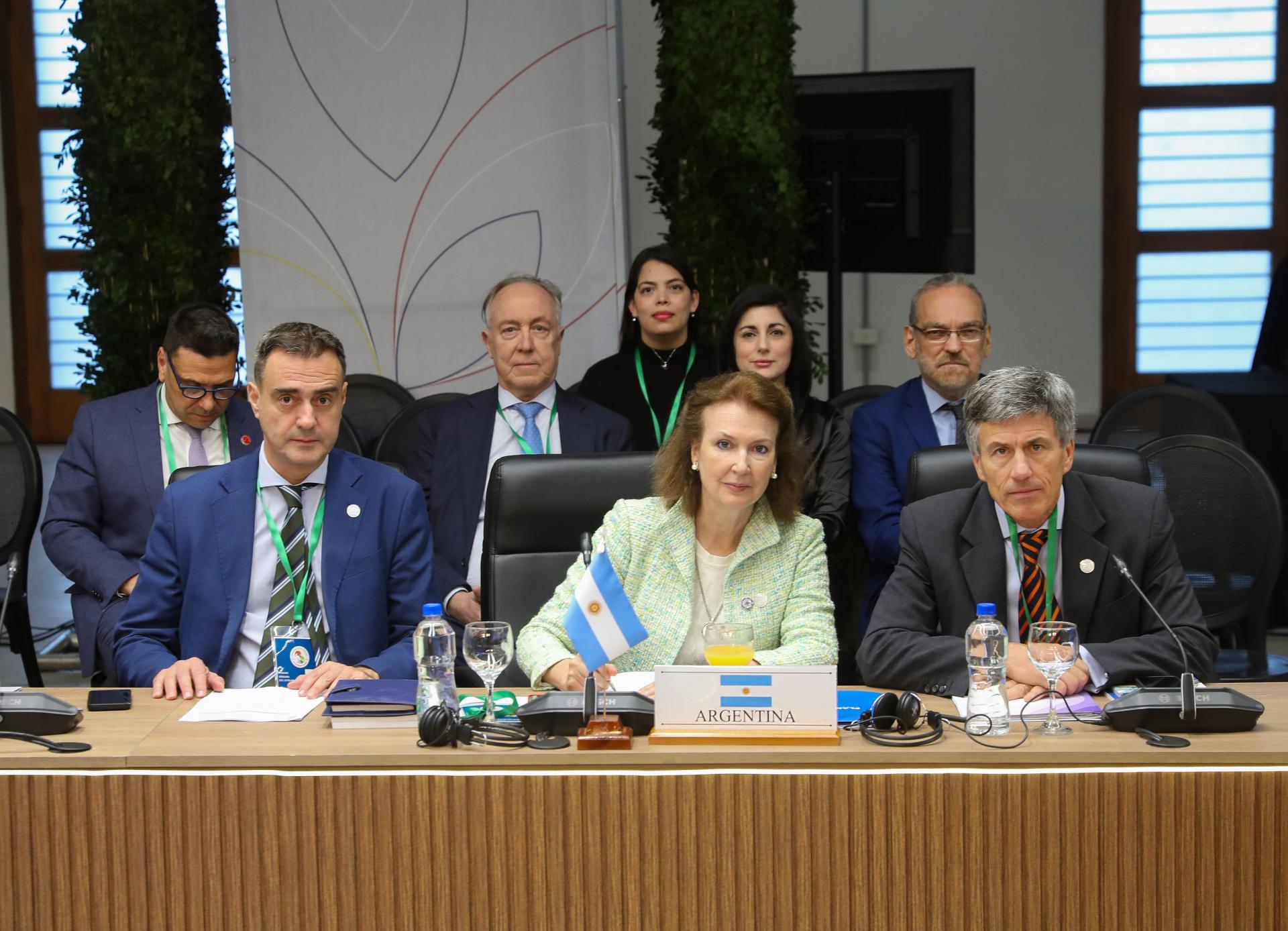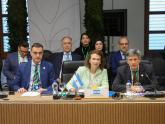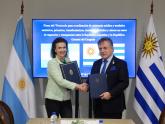Following her participation in the morning session of the 64th Meeting of the Council of the Common Market of MERCOSUR, Foreign Minister Diana Mondino participated in the Meeting of MERCOSUR Member and Associate States, at which she stated that “as in every consultation forum, the founding members (as well as the Associate States) can and should be listened to. The added value of these meetings lies precisely in the exchange of views, which, far from being a problem, should be accepted as a healthy practice for the benefit of all members.”
She also said that: “In this regard, our current administration, elected with broad popular support, has come to put forward new opinions and seek new forms of consensus, sometimes not in line with the view of the majority, but always with the firm conviction of enriching the conversations for the benefit of the whole region and, above all, highlighting that we are all equal under the law, with no distinctions. This is evidenced by the fact that many countries, at different fora, have voiced their open support for this fresh air breeze that has come to help new ideas bloom.”
She further pointed out that “since 10 December 2023, there are no more ambiguities or vague or ambivalent positions for Argentina. Individual freedoms, respect for the will of the people and the rule of law are non-negotiable. We hope that this year of celebration of democracy on our continent and in the world constitutes the right framework for strengthening political rights in all the region.”
“Argentina is firmly committed to the principles of regional integration and mutual cooperation. We believe that Mercosur is a vital tool to promote economic development, political stability and regional security. In this context, I would like to stress the importance of the Political Agreement and Consultation Forum (FCCP) as a serious and stable mechanism for sharing experiences and best practices among our countries,” Mondino underscored.
The Argentine Foreign Minister then affirmed: “We are not disruptive. We are different, and diversity and tolerance are well-established principles among the international community. We should never silence anyone’s ability to think or speak, which should always be exercised freely and respectfully,” after which she read out Article 16 of the Argentine Constitution.
Mondino stressed that “the Argentine Republic ranks security among the most prominent topics on both the domestic and foreign agendas. Cooperation in security is essential to face transnational threats such as terrorism, drug trafficking, and human trafficking, among others. This is why we believe that sharing information and cooperating in intelligence matters are fundamental pillars to face these threats, as reflected in the Special Communiqué on the Fight Against Transnational Organized Crime.”
Regarding security matters, the Foreign Minister pointed out that “unfortunately, terrorism is still a global threat and our region is not free of this scourge. It is fundamental that we work together to prevent any form of violent extremism, considering that transnational organized crime is a threat that requires a joint and coordinated response.”
She further added that Argentina has strengthened its legal and operative framework to combat terrorism and is willing to share its experience and collaborate in developing comprehensive regional strategies. “We believe that illicit arms trafficking feeds violence and organized crime, which is why Argentina is working to improve arms control and regulation within its borders and proposes greater regional cooperation in this regard,” she held.
In addition, she pointed out that “controlling our borders is essential to prevent the illegal flow of persons, arms, drugs and smuggling, and our country is investing in training security forces, as well as in advanced technologies for surveillance and border control in order to achieve that goal.”
Regarding human trafficking, Mondino said that “it is one of the most serious human rights violations and a crime that affects our societies at their core. Argentina has stepped up its efforts to combat this scourge, improving the prompt identification and protection of victims and prosecuting those responsible.”
She further added that “drug trafficking is one of the main threats to security in our region. Argentina is committed to the fight against this scourge and has implemented strict policies to combat drug production and trafficking.”
“Likewise, organized crime within penitentiary systems is yet another significant challenge. Argentina is implementing reforms to improve security in penitentiary centres and promotes regional collaboration in this area. The exchange of information on dangerous inmates and the implementation of common prison security protocols can prove effective towards eradicating organized crime within our prisons,” she said, adding that “In this context, at the meeting of the FCCP yesterday, we advised that we will submit a proposal for the creation of an Anti-Mafia Prosecution Unit of MERCOSUR to boost the efforts of national prosecution offices through information sharing and the design of common strategies to combat organized crime.”
In this regard, Mondino said that “work would not start from scratch. On the contrary, we would draw on the joint work and the past experiences of auxiliary bodies and fora of MERCOSUR’s institutional structure, including, for instance, the Meeting of Justice Ministers, the Meeting of Ministers of the Interior and Security of MERCOSUR (RMIS) and the Specialized Meeting of Public Prosecutors of MERCOSUR (REMPM).”
Finally, Mondino reiterated Argentina’s proposal to “advance a profound institutional and financial updating for MERCOSUR, with the aim of guaranteeing a rational and efficient use of the resources allocated to the operation of the four bodies of MERCOSUR with their own budget for this year.” This proposal, of a cross-sectoral nature, seeks to prevent the duplication of tasks and to achieve greater effectiveness in the fulfilment of MERCOSUR’s objectives, including advancing a deep administrative and financial reform of MERCOSUR as from 2025.
Agreements signed
On a different note, on the sidelines of the MERCOSUR Summit, Foreign Minister Mondino signed with her Uruguayan counterpart, Omar Paganini, a “Protocol for the coordination of medical care and trans-border primary care transfers by land, river and air in case of urgency and emergencies.” This Protocol will provide a legal framework for the existing cooperation between cities on both margins of the Uruguay River in case of serious emergencies, facilitating trans-border movements and medical care.
The objective of the Protocol is to help guarantee, through trans-border cooperation efforts, an exceptional and extraordinary facilitation of movement across international border crossings for medical care and transfers by healthcare professionals recognized by the country of origin in order to assist people affected in case of urgency or emergencies, including road accidents, calamities and natural disasters.
In addition, together with her bloc counterparts, Mondino also signed the Agreements on Financial Complementarity and Technical Complementarity between MERCOSUR and FONPLATA, as well as a cinematographic cooperation agreement for MERCOSUR.



